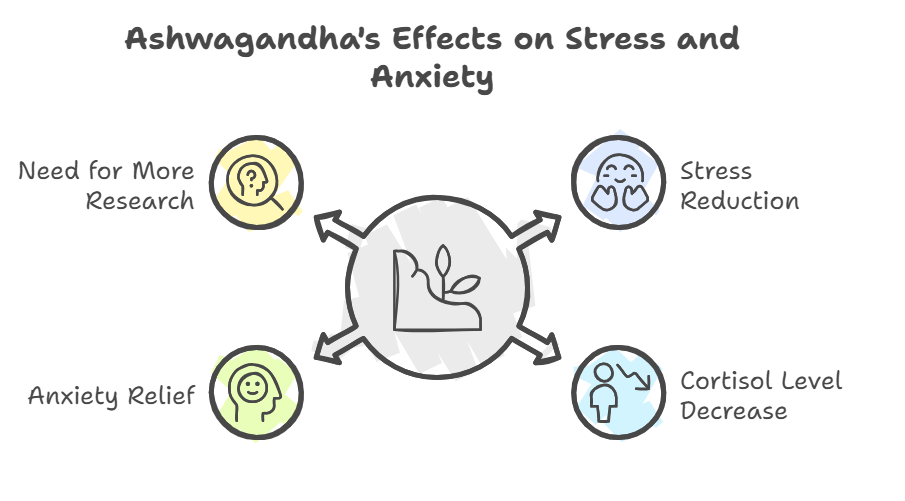You might have heard whispers about ashwagandha tea and its potential health benefits. It’s not just another health fad; it’s a practice rooted in ancient Ayurvedic medicine. Ashwagandha has been used for thousands of years. It helps relieve stress and improve focus.
“Research suggests that ashwagandha can help lower cortisol levels, promoting relaxation and reducing stress.”
Dr. Andrew Weil
This adaptogenic herb comes from India and Southeast Asia. Now, it’s appearing in mugs all over the globe. Many of us are curious about what ashwagandha tea can offer. It’s normal to wonder if this is a real solution or just another trend.
Unpacking Ashwagandha Tea Benefits: More Than Just a Trend
Ashwagandha, or Withania somnifera, is commonly known as “Indian ginseng” or “dunal root.” This adaptogen is believed to help the body manage stress more effectively.
Its name comes from Sanskrit. “Ashwagandha” means “smell of the horse.” This name comes from its unique scent and the belief that it can give you the strength and energy of a horse1. Here you can see most popular ashwagandha tea benefits:
Stress and Anxiety Relief
Ashwagandha is best known for its potential in reducing stress. It may help control stress mediators, such as heat shock proteins and cortisol. This could reduce the body’s stress response and serve as a natural way to ease anxiety.

Studies suggest that ashwagandha supplements might help with stress and anxiety. A small study found that taking 250 mg or 600 mg of ashwagandha root extract for 8 weeks reduced perceived stress. It also lowered cortisol levels, the stress hormone.
A study showed that those who took 240 mg of ashwagandha root extract daily for 60 days felt less anxious. A 2021 review found that more scientific evidence is needed to confirm these effects.
Boosting Athletic Performance
Ashwagandha might also benefit athletes and those looking to improve physical performance. A study found that ashwagandha might boost physical performance. This includes improvements in strength and endurance.
Another analysis revealed enhanced maximum oxygen consumption (VO2 max) in individuals taking ashwagandha. A higher VO2 max often means a lower risk of heart disease. It also leads to better cardiovascular health2.
A 2015 study showed that men who took 600mg of ashwagandha each day gained more muscle strength and size. They did this alongside 8 weeks of resistance training. This was better than those who took a placebo. This shows that this plant may help improve performance.
Potential Mental Health Ashwagandha Tea Benefits
Ashwagandha might also offer support for mental health. A clinical trial studied ashwagandha in people with schizophrenia, depression, and anxiety. Researchers aimed to see what benefits it could provide.
Participants taking 1,000 mg of ashwagandha root extract daily reported fewer symptoms during the 12-week study. Some evidence shows that ashwagandha might help people with bipolar disorder.
It may improve their cognitive function. More randomized controlled studies will show how it impacts various mental health issues.
Potential for Increased Testosterone and Fertility in Men
It has also been shown to improve sperm quality in men. A study followed 43 overweight men aged 40 to 70 with mild fatigue. Those who took the supplement daily noticed an 18% increase in DHEA-S after eight weeks. Learn more about natural testosterone-boosting options here.
It has also been shown to improve sperm quality in men. A study followed 43 overweight men aged 40 to 70 with mild fatigue. Those who took the supplement daily noticed an 18% increase in DHEA-S after eight weeks3.
This sex hormone is involved in testosterone production. Participants saw a 14.7% larger boost in testosterone than those on a placebo. This suggests possible health benefits for hormone levels.
Possible Blood Sugar Reduction
Some evidence shows that people with blood sugar issues might benefit from ashwagandha. This can help with weight management. It works best with a good diet and exercise plan.
A review of 24 studies, including placebo-controlled ones, found that ashwagandha treatment lowered:
- Blood sugar
- Hemoglobin A1c (HbA1c)
- Insulin
- Blood lipids
- Oxidative stress markers
Some compounds in ashwagandha, like withaferin A (WA), may help fight diabetes. They might boost cells to absorb glucose from the blood. More research will clarify the extent of these benefits4.
If you’re looking for a natural way to manage stress and improve your well-being, ashwagandha might be worth trying. I recently came across something that blends its benefits with other calming ingredients – Calming Tulsi Ashwagandha Tea. It’s a simple, easy-to-use option that fits right into a daily routine. This tulsi ashwagandha tea might be helpful if you’re exploring ways to feel more balanced.
Ways to Reduce Inflammation
Ashwagandha tea has compounds, such as WA, that may lower stress and inflammation in the body. Animal studies show that WA can lower inflammatory proteins like interleukin-10 (IL-10).
In a study, researchers gave COVID-19 patients Ayurvedic medicine. It contained 0.5 grams of ashwagandha, taken twice daily for one week. Those who took ashwagandha showed better inflammatory protein markers than those who did not5.
This research suggests potential anti-inflammatory effects. But do keep in mind, these results have come under specific clinical trial.
Impact of Thinking, Memory and the Brain
Taking ashwagandha root extract might improve cognitive function, offering potential health benefits for the brain. A review of clinical studies indicated improvements in several areas:
- Immediate and general memory.
- Executive function.
- Attention.
- Information processing speed.
These findings suggest that ashwagandha could help enhance the sharpness of cognitive processes, potentially benefiting individuals experiencing cognitive dysfunction. The results look promising and continue to get studied.
Improve Sleep
Many people turn to ashwagandha tea to help achieve restful sleep and improve sleep quality. For instance, a study involving older adults found that daily dosages of ashwagandha tea significantly impacted sleep quality and mental alertness upon waking.
Participants reported feeling more rested and alert. These results highlight ashwagandha’s potential as a natural sleep aid.
Here is a helpful table showing dosages of ashwagandha tea used for different benefits:
| Benefit | Dosage | Duration |
|---|---|---|
| Stress & Anxiety Relief | 250-600 mg | 8 weeks |
| Improved Sleep | 600 mg | 8-12 weeks |
| Enhanced Physical Performance | 600 mg | 8 weeks |
| Cognitive Function Support | 500-1000 mg | 12 weeks |
Ashwagandha Tea Recipes and Brewing Methods
Making ashwagandha tea can be a straightforward process. A common method involves steeping the dried ashwagandha root in boiling water, similar to how many fine teas are prepared. Here’s a basic recipe to try:
- Boil water in a kettle or pot.
- Add 1-2 teaspoons of dried ashwagandha tea root to a tea infuser or directly into the pot.
- Pour the boiling water over the root and allow it to steep for 10-15 minutes.
- Strain the tea into a mug if you didn’t use an infuser.
You can adjust the strength and flavor by experimenting with the amount of root and brewing time. Some people enjoy adding natural sweeteners like honey or spices such as ginger to enhance the taste, creating a soothing alternative to morning coffee.
Safety, Dosage, Ashwagandha Tea Side Effects
Ashwagandha tea is generally considered safe for most people. It is likely safe when taken for up to three months.
However, it’s important to be aware of potential ashwagandha tea side effects, though they are typically mild. Commonly reported side effects include:
- Mild drowsiness.
- Loose Stool.
If any severe side effects arise or if you experience persistent discomfort, seek professional medical guidance immediately from a healthcare provider. Sometimes you might not know the specific cause and require medical assistance to avoid complications.
Frequently Asked Questions
What are the main ashwagandha tea benefits?
Ashwagandha tea is commonly taken to help manage stress and promote relaxation. It might also boost cognitive function, improve physical performance, and enhance sleep quality.
Keep in mind that individual responses to supplements can vary. Not everyone is going to see the same benefit with taking ashwagandha in any form.
Can I drink ashwagandha tea everyday?
Many people take ashwagandha daily without adverse effects. However, it’s generally recommended to stick to moderate intake unless otherwise directed by your healthcare provider. Some sources, have expressed specific precautions.
Who should not drink ashwagandha?
Pregnant or breastfeeding women should avoid ashwagandha tea. Individuals with thyroid disorders or autoimmune conditions, such as rheumatoid arthritis, Crohn’s disease, psoriatic arthritis or ulcerative colitis, should consult a doctor before using ashwagandha.
Conclusion
Ashwagandha tea has potential health benefits. It combines traditional use with new scientific research. Ashwagandha can help with stress and anxiety. It may also boost brainpower and physical performance. This herb offers many potential benefits.
It’s worth considering ashwagandha tea for those interested in natural health alternatives. The journey with ashwagandha tea is personal. It’s best to seek guidance from a healthcare professional when using any supplement.
Small Step, Big Impact
For a ready-to-use solution, look for high-quality ashwagandha tea blends or tea bags from trusted brands like tulsi ashwagandha tea. Opt for organic versions to avoid additives and maximize benefits.
Listen to this article
This is an AI generated Podcast version of the article.
- https://teaforguys.com/blogs/news/your-complete-guide-to-ashwagandha-benefits-uses-side-effects-and-more?srsltid=AfmBOoqaVR5Vf-P1fMK24wL_hqOpmuJUpoBKP9IH5dCUN7qaAoK5jbY1[↩]
- https://www.researchgate.net/publication/340838628_Effects_of_Ashwagandha_Withania_somnifera_on_VO2max_A_Systematic_Review_and_Meta-Analysis[↩]
- https://www.mariongluckclinic.com/blog/ashwaganda-health-benefits-for-men-libido-energy-more.html[↩]
- https://pmc.ncbi.nlm.nih.gov/articles/PMC10147008/[↩]
- https://jfrm.ru/en/issues/22431/22447/[↩]



